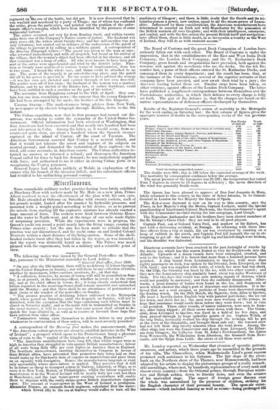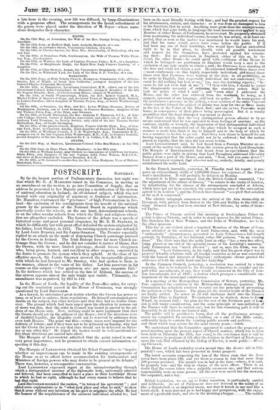aligrtIlautnuff.
Some remarkable military rocket practice having been lately exhibited at Shoebury-Ness with rockets made by Mr. Hale on a new plan, Prince Albert resolved to test the effectiveness of the plan with his own eyes. Mr. Hale attended at Osborne on Saturday with twenty rockets, each of ten pounds weight, loaded after his manner by hydraulic pressure, and mounted with a weight poised according to his device, so as to prevent the missile from starting till the explosive mixture has already exerted a large amount of force. The rockets were fired between Osborne House and the water to North-west, and at the range of one mile made flights of surprising precision. While the experiments were in progress, the Queen's yacht ran round a point nearly into the firing range, causing the Prince some anxiety ; but the aim has been made so reliable that the practice was not discontinued, and the yacht came on and landed Colonel Bouverie within a short distance of the firing-station. Some of the shell- headed rockets burst after they had fallen in the water, as was intended ; and the report was distinctly heard on shore. The Prince was much pleased with the experiments, both in a military and a scientific point of view.
OMI•■•■•■■••11
The following notice was issued by the General Post-office on Thurs- day, pursuant to the Ministerial surrender to Lord Ashley.
" General Post-oliee,June 1850.
" On and after the 23d instant, there will be no delivery of letters through- out the United Kingdom on Sunday ; nor will there be any collection of letters, whether by messengers, letter-carriers, receivers, &c., on that day.
" A collection, however, by means of boxes, will still be permitted on Sun- day, as at present, at the receiving-offices, whether in towns or in the coun- try, and at the chief offices in towns, &c. ; it being clearly imderstood that letters deposited in the receiving-boxes shall remain unsorted and untouched until the Monday ; and that there shall be no attendance of postmasters or their clerks at the window of the post-office on Sunday. " The present practice of detaining letters addressed to the Metropolis
itself, when posted on Saturday, until the despatch on Sunday, will not be disturbed, with the exception that the bags containing such letters must be closed on Saturday night ; and as the mails will be transmitted on Sunday in the usual manner, it will be necessary that some person shall attend to de- spatch the bags alluded to, as well as to receive or forward those bags that have arrived from other offices.
" Postmasters taking upon themselves to deliver letters to any parties whatsoever in contravention of these orders, will be most severely punished.'
A correspondent of the Morning Post makes the announcement, that " the American cotton-growers are about to establish factories in the West of Ireland" ; a prospect which opens to his Protectionist fancy a pleasant vista of ruin to the " capital of the kingdom of cotton, Manchester." " The American manufacturers have long felt, that whilst wages were so high in America they struggled in vain against British manufacturers ; labour of all sorts being fully fifty per cent higher in America than in England. The Southern slave-owners, exerting themselves in Congress in favour of their British allies, have prevented that protective duty being laid on that would make up for this heavy item of expense in manufacture and place them on an equality' with foreigners. Hence, the manufacturers languish or exist only successfully where slave-labour is applied. They perceive that it will be in future as cheap to transport cotton to Galway, Limerick, or Sligo, as to carry it to New York, Boston, or Philadelphia ; whilst the labour required to manufacture it in the West of Ireland will be nearly forty per cent less than at Manchester, and the vast water-power existing everywhere will enable them to dispense with the costly steam-power British manufacture depends u jemzind .tThe amount of water-power in the West of Ireland is prodigious. Alexander Ninuno, an eminent Scotch eugMeer, calculated that the water- which flowed idly to the sea at Galway would suffice to turn all the machinery of Glasgow; and there is little doubt that the Corrib and its tri- butaries possess a power, now useless, equal to all the steam-power of Lanca- shire. Influenced by these considerations, the American manufacturers have determined to contend on Irish soil with Manchester for the possession of the British markets all over theglobe ; and with their intelligence, enterprise, and capital, and with the free action the present British tariff and navigation- laws afford them, there is little doubt, in so favourable a locality as the West of Ireland, they will do so with eminent success."
The Board of Customs and the great Dock Companies of London have seriously fallen out with each other. The Board of Customs is under the impression, that in the establishments of the East and West India Dock Company, the London Dock Company, and the St. Katharine's Dock Company, gross frauds and irregularities have prevailed, both against the revenue and against the merchants who use the docks. On the 4th De- cember last, a posse of their officers entered the St. Katharine Docks, and rummaged them in every department; and the result has been, that, at the instance of the Customhouse, several of the superior servants of that company have been arrested, and now await their trial by a jury; the directors having bailed them out. Similar steps have been taken, on other evidence, against officers of the London Dock Company. The latter have published a lengthened correspondence between themselves and the Customhouse authorities, in which their defence to every charge is fully set forth. The gist of the defence is, that the charges are based on the untrue representations of dishonest officers discharged by themselves.
Results of the Registrar-General's return of mortality in the Metropolis for the week ending on Saturday last: the first column of figures gives the aggregate number of deaths in the corresponding weeks of the ten previous years.
Ten Weeks of 1839-49.
Zymotic Diseases 1741 .... 167 Dropsy, Cancer, and other diseases of uncertain or variable seat 492 .... 36 Tubercular Diseases 1913 .... 113 Diseases of the Braila, Spinal Marrow, Nerves, and Senses 1091 .... It Diseases of the lleart and Blood-vessels 39 Diseases of the Lungs, and of the other Organs of Respiration 964 • • • • 92 Diseases of the Stomach, Liver, and other Organs of Digestion fil3 • • • . 33 Diseases of Ike Kidneys, HT 84 • • • • 11 Childbirth, diseases 01 the Uterus, &c Si 13 Premature Birth 215 •..... I.. 29 Rheumatism, diseases of the Bones, Joints, Sc 60 • • • • 5 Diseases of the Skin, Cellular Tissue, Sc 10 1 Malfurmations 23 ....
Atrophy 1229 Sudden , , . : 35 Age 448 11.1 .Violence, Privation, Cold, and Intemperance 19..... ia
'Week.
of 1810.
' .. n
otal (including unspecified causes) 8510 800
The deaths were 800 ; this is 128 below the corrected average of the week. The mortality by consumption continues below the average. The mean pressure of the barometer was 29.702; the temperature has varied from 7 degrees in excess to 13 degrees in deficiency ; the mean direction of the wind was generally South-west.
The Queen has been pleased to approve of Don Jose Joaquin de Mora, lately returned to this country in the suite of Senor leturitz, to be Consul- General in London for her Majesty the Queen of Spain.
The Koh-i-noor diamond is now on its way to this country, says the Times, in her Majesty's ship the Medee., Captain Loekyer, under the special guardianship of Lieutenant-Colonel Mackeson, the Governor-General's agent with the Commander-in-chief during the late campaign, Lord Gough.
The Nepaulese Ambassador and his brothers have been elected members of the St. George's Chess Club : they are said to be all good players.
Captain Peel, son of Colonel Yates Peel, and nephew of Sir Robert, has met with a distressing accident, at Nens&. In returning with three bro- ther officers from a trip at night, the car was overturned by running on a heap of rubbish in the street, and Captain Peel fell beneath the car in at- tempting to get off : the bones of his right leg and hisleft thigh were broken, and his shoulder was dislocated.
Disastrous accounts have been received in the past fortnight of wrecks by the Arctic ice, which has this season floated so very far Southwards into the Atlantic. Upwards of a dozen vessels have been entangled, crushed, and sent to the bottom ; and it is feared that more than a hundred persons have perished. A ship bound from Londonderry to Quebec, with more than eighty passengers on deck, was spoken by the Oriental, from Liverpool, on the 17th April ; and was supplied with water, of which her store had run short. On tke 27th, the Oriental was beset by the ice, with two other vessels; and they saw the Londonderry ship similarly beset about ten miles Westward of them. For two days this vessel was seen making signals of distress, which could not possibly be answered ; and then she suddenly disappeared. After- wards, a great number of bodies were found in the ice, and fragments of wreck which showed the ship's port of departure and destination. It is be- lieved that not a soul escaped, as portions of boats were discovered among the floating wreck. On the 29th March, the Signette, from Alloa to Quebec, stw beset a heavily-laden English brig with painted port-holes ; the ice cut her down, and stove her in ; the men were seen working at the pumps, in hope that assistance would reach them before they went down ; but in vain —all perished. Three other vessels, of names unknown, were seen to foun- der, after being nipped ; all their crews went down with them. The Osten- sible, from Liverpool to Quebec, was fixed in a field of ice five days, and then pierced through by huge spikelike points of ice. Captain Welsh, of the brig Duke, heroically worked his ship through the icebergs, till he got at the crew of the Ostensible, and brought them safe out : the rescued crew had not left their ship twenty minutes when she went down.. Among the other ships lost were the Conservator and Acorn from Live ...1, the Hiber- nia from Glasgow, the Collector from St. John's Newfoun. d, the Astrea from Weymouth, the Wilhelmina from Aberdeen, the Gossatell from New- castle, and the Sylph from Leith : the crews of all these were saved.
Mr. Lumley repeated on Wednesday that reunion of operatic patrons, amateurs, and artists, which three years ago he assembled in the grounds of his villa, The Chancellors, when Mademoiselle Lind's great success promised such assistance to his fortunes. The fair slope of the river- bank on the Northern shore of the Thames, near Hammersmith, had been adapted by his artists to display the picturesque groups of a really remark- able assemblage, where met, by hundreds, representatives of every rank and almost every country—from the Oriental prince, through European minis- ters and British nobles, down to literary lions, and even the artistes of his unrivalled stage. The aspect of foreign grace thrown over the whole was naturalized by the presence of children, striking for the Etiguish character of their personal beauty. The open-air enter- tainment—which included dancing 1113 well as music—being prolonged till a late hour in the evening, new life was diffused, by lamp-illuminations with a gorgeous effect. The arrangements for the lavish refreshment of the guests were placed under the direction of M. Soyer—whose name alone designates their character.



























 Previous page
Previous page